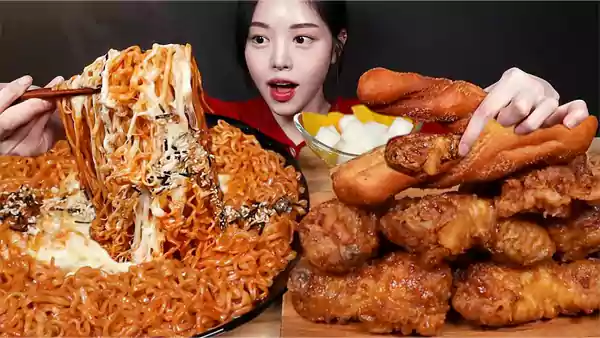Mukbang means eating broadcast, where the creator mainly focuses on consuming a large amount of food.
There is no doubt that South Korean culture is gaining more fame with the passing days, be it because of K-pop, Korean dramas, etc. While most of them are great, one trend has recently caught the eyes of many parents: Mukbang.
Though in the beginning mukbang used to accompany people while eating, lately, it has become controversial for promoting gluttony. Watching those shows, kids tend to adopt a wrong perception of body image and end up developing some risky habits.
So, as parents, I believe we need to pay special attention to mukbangs. Here, I’ve jotted down all you need to know about what is mukbang food, the risks that come along with it, why people like it, and so on!

Mukbang comes from the Korean word ‘meokbang.’ It translates to ‘meongneun bansong’ where ‘meongneun’ means eating and ‘bangsong’ means broadcast.
To put it simply, mukbang means eating broadcast. It is an audio and visual broadcast that mainly focuses on the hosts eating a large quantity of food (it can also be a small amount) in videos and live streams.
There are many sub-genres of mukbang, such as sulbang (sul bangsong meaning: alcohol broadcast) and cookbang (cooking broadcast). Many mukbangs also focus more on audio and tend to record every eating sound, which is called ASMR (autonomous sensory meridian response) mukbangs.
Though mukbangs have become relatively popular in recent years because of the rise of Korean culture, this trend is apparently gaining a lot of criticism because of mukbang hyperconsumption.
Mukbang BJs means mukbang ‘broadcast jockeys.’ It’s similar to other roles like DJs and VJs and simply translates to mukbang streamer. South Korean mukbangers seem to have given themselves this title.
This online eating culture came around in South Korea in the late 2000s. To be exact, it was first introduced in 2009 on the live broadcasting service Afreeca TV (now known as SOOP).
Since then, it has become pretty popular among many countries like Japan, China, and even foreign ones. It has also become a good career since mukbangers earn a huge income through advertising, sponsorships, endorsements, and audience support.
Logically speaking, mukbang is a type of content that is made to entertain people, so obviously people watch it to satisfy their cravings and get entertained. But there are a number of reasons why people do that.
South Korean dining culture mainly focuses on communal eating and sharing. They consider eating out and socializing a great deal. So, for the people who feel outcasts in social circles, watching mukbang becomes a way to get rid of loneliness and get a sense of companionship.
Creators also know this, and that’s why they regularly interact with audiences and make jokes here and there. This gives people a feeling of eating with a virtual friend.
I don’t know when the ASMR trend started, but it has become pretty hyped. Many mukbangers mainly focus on ASMR eating, like recording the sound of eating, slurping, biting, etc., since some people watch Mukbang for the sake of ASMR (people say it’s relaxing and gives them an escape from reality…).
Some people are just interested in exploring the cuisines of every corner. They watch creators eat exotic dishes that are not available in their region, and some just like it because of the prepping and cooking that’s shown in cookbangs.
Researchers say that another reason people tend to watch mukbang is because of its potential sexual appeal. They say that watching creators eat in a private setting satisfies people’s eating-related fetishes (I know it’s weird, but it’s a reality).
I won’t say watching mukbang is life-threatening, but mukbang hyperconsumption can be risky for kids.
Studies say that it leads kids to develop unhealthy eating habits and negative body image. Since kids learn what they watch, they are more likely to think that eating heavy amounts is a norm.
They might try to imitate the influencer and eat a large amount of food, more than their body can handle. It can put them at risk of obesity, weight gain, and even death if the situation gets out of hand.

I know watching mukbangs is pretty fun and exciting, but it comes with multiple risks that you must pay special attention to.
If someone watches mukbangs regularly, they are bound to develop similar eating habits. It might encourage the viewers to try out bulk eating and lead them to obesity, weight gain, and many other life-threatening health diseases.
These types of shows can have a negative impact on people suffering from anorexia (fear of gaining weight) and bulimia (binge eating). This can cause them to either live through watching the mukbanger or imitating the creator and binge-eating.
“What we see on social media isn’t the reality.”
Nikocado Avocado, a popular American mukbanger, is a prime example of that. He made it look like he had given up on dieting, but he was posting pre-recorded videos and had lost weight behind the scenes.
Many mukbangers often spit out the food and edit the videos like they have eaten it all. Also, many creators don’t finish all the food in one sitting. Instead, they merge all the videos and make it look like they finished everything at once.
This can cause people to believe that they can also binge eat and not feel sick at all.
We all know that binge eating is never healthy. It takes a huge toll on your body and causes you to develop many diseases, such as a weak immune system, joint pain, and trouble breathing.
A study in 2021 found that people who watch too much mukbang are more likely to have eating disorders and internet addiction. It said that mukbangers and their viewers both have bad eating habits and as these shows become popular, they encourage such bad habits.
Some studies say that a huge amount is wasted because of mukbangs. Most mukbangers just create a false illusion that they ate everything, though, in reality, it was all spit out.
Because of such creators, a lot of food just goes down the drain. To prevent this food waste, the Chinese govt. even launched a “Clean Plate” campaign.
Many mukbang streamers eat sea or live creatures in their streams, though most of them ended up receiving heavy backlash from the public. A few years ago, a food blogger live-streamed eating a great white shark, though later she was fined $20,000 as it was an endangered species.
Ssoyoung, a popular mukbanger, was also accused of harming many sea creatures, such as fish, sharks, crabs, squid, and octopuses.
Watching mukbang might be okay to some extent, but the problem is the algorithm of YouTube and other SMPs. It might lead your kids to sulbang (alcohol shows), and since there is no restriction on those shows, kids can easily watch them.
They might try to imitate the creators drinking alcohol or learn some bad drinking habits.
Many creators also create mukbangs just to satisfy the weird fetishes of people. So, if your kids come across that, they might be negatively affected.
Since people tend to get more attracted to challenges that are more on the extreme side, streamers attempt to eat a huge amount of food in their videos. Though it’s discomforting, some viewers find pleasure in it.
What if your kid also tries to copy those challenges for giggles?
If you are afraid your kid might learn something bad from these shows or develop some scary diseases, you gotta learn to be provocative. Here I’ve got some tips for you.
This was all for what is mukbang food!
Watching mukbangs is no crime unless your kids try to copy the creators or use those videos to satisfy their hunger. So, the best thing you can do is just co-watch the shows with them. It will help you know what their afterthought is and what they gained from it.
Other than that, you can teach your kids to be mindful of their eating habits, reduce their screen time, and pay special attention to their physical activity.
Mukbang means eating broadcast, where the creator mainly focuses on consuming a large amount of food.
While some mukbangers eat all their food, others just pretend to eat but spit it out later and edit that part out.
No, watching mukbang is not as healthy as one might think.
Yes, mukbang is banned in the Philippines and China.
